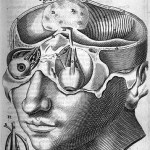Free Will
With 2001 in the rear-view mirror, there have been no little green men, no meal-replacement pills, no flying automobiles, no space odysseys. But as big-budget plans to model the human brain prove, proponents of artificial intelligence remain hopeful. In its most literal sense, AI exists already: encoded and executed, endowed with sensors, lenses and microphones, connected to the internet, and stuck in your pocket. But how intelligent does a machine have to be before our worst nightmares come true? Intelligent enough to pass a Turing test? Intelligent enough to nuke the human race? And/or…
When it comes to the human brain, even the simplest of acts can be counter-intuitive and deceptively complicated. For example, try stretching your arm.
Nerves in the limb send messages back to your brain, but the subjective experience you have of stretching isn't due to these signals. The feeling that you willed your arm into motion, and the realisation that you moved it at all, are both the result of an area at the back of your brain called the posterior parietal cortex. This region helped to produce the intention to move, and predicted what the movement would feel like, all before you…
Lately, I've been pondering our use of models to predict the future conditions of our planet. However, it is also nearly Halloween. Together, it seems like a good time to pull out this old post of mine, which asks if a deck of Tarot cards can be a useful tool for modeling a person's life.
Don't get me wrong... I'm not about to attempt to defend some pseudoscience, nor am I going to expose a mass of woo. Instead, this is more an argument between two sides of personality: the battle between the skeptic and the empath.
If you've read some of my [older] fictional entries, such as A Hint of…
The results of a diabolical experiment are forcing scientists and philosophers to reevaluate their notions of free will.
Bj/drn Brembs from the Free University in Berlin began his experiment by postulating that if fruit flies are no more than biological robots simply reacting to their environments (i.e. beings without free will), then they should move completely randomly in a featureless room. Then in stroke of pure, evil genius, Brembs and his team glued tiny hooks (attached to strings) to the heads of fruit flies and let them "loose" in completely white surroundings. The fruit flies could…
Witches, stew, and a battle...
A well-timed meme floated into ScienceBlogs over the weekend, asking what advice we might have for our 12-year-old selves. This began as John Lynch at Stranger Fruit borrowed the survey question from Fark.com. Soon, others began to respond, including Janet at Adventures in Ethics and Science and Chad at Uncertain Principles. Why is this well timed, you might ask? Or, what could advice to a younger self have to do with witches and other figments of a Halloween-infused imagination? Well, take my answer, and season it with the spice of battles: youth versus…
As the length of the day in the northern hemisphere wanes, so, it seems, does the prolificacy of blogging. I haven't posted anything in about a week, after an already reduced rate. Some of my SciBlings, other bloggers here at ScienceBlogs, have reported taking a similar rest. What's going on? Is there nothing to write about? Hardly. If anything, there is a surplus of information out there, waiting to be pulled into the blogosphere-new discoveries, upcoming elections, reviews on books and films, stories, ethical debates, and so on. I have a series to finish, and a few other items on my "must…
